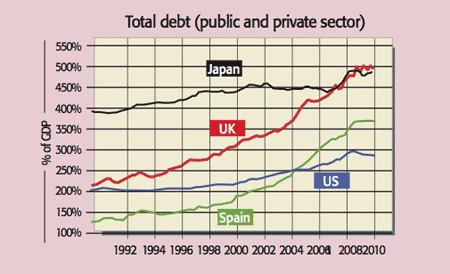Get the latest financial news, insights and expert analysis from our award-winning MoneyWeek team, to help you understand what really matters when it comes to your finances.
You are now subscribed
Your newsletter sign-up was successful
Want to add more newsletters?

Twice daily
MoneyWeek
Get the latest financial news, insights and expert analysis from our award-winning MoneyWeek team, to help you understand what really matters when it comes to your finances.

Four times a week
Look After My Bills
Sign up to our free money-saving newsletter, filled with the latest news and expert advice to help you find the best tips and deals for managing your bills. Start saving today!
Scaling down American growth forecasts has become "a depressing routine" for America's Federal Reserve, says The Economist. A year ago the US central bank expected growth of 4% this year. Now the figure is 2.8%.
Last week's lousy employment report, with only 18,000 jobs created in June, is the latest disappointing milestone in a lacklustre recovery. In other developed countries, too, the recovery has fallen short of expectations and previous post-war economic rebounds. "Lacklustre", says Telegraph.co.uk's Philip Aldrick, "is the new normal."

A key reason for the slow recovery is that the bursting of the massive credit bubble "left an enormous burden of debt that... weighs on the prospects for recovery", says a report by the McKinsey Global Institute. After a long debt binge, now comes the hangover. According to the study, countries typically spend around six to seven years deleveraging, or working off debt. The private and public sectors concentrate on repaying debt rather than spending, hampering growth.
MoneyWeek
Subscribe to MoneyWeek today and get your first six magazine issues absolutely FREE

Sign up to Money Morning
Don't miss the latest investment and personal finances news, market analysis, plus money-saving tips with our free twice-daily newsletter
Don't miss the latest investment and personal finances news, market analysis, plus money-saving tips with our free twice-daily newsletter
Debt burdens in Western countries reached record levels before the bubble burst. Adding all private and public debt together, Britain's debt burden reached almost 500% of GDP, says McKinsey. Spain and France's debt burdens are around 350% of GDP and America's about 260% of GDP.
During deleveraging, the debt ratio usually falls by 25%. So far, however, there has barely been any progress. That's because although across the developed world private debt has fallen slightly, government debt has risen. Only in America has the overall ratio fallen appreciably of late as households have trimmed their burden. "The pattern and speed of deleveraging vary across the major economies... but it is clear that deleveraging has only just begun," says McKinsey Global Institute.
Some countries, such as Germany and Canada, which entered the crisis with relatively low household and government debt, have grown quickly, says The Economist. But in general, "the difficult business of debt reduction will hold back the world's rich economies for several more years. Get used to it." The same goes for stockmarkets. As John Authers of the FT points out, after severe financial crises, there is typically "choppy sideways trading for many years, coupled with extreme uncertainty".
Get the latest financial news, insights and expert analysis from our award-winning MoneyWeek team, to help you understand what really matters when it comes to your finances.
MoneyWeek is written by a team of experienced and award-winning journalists, plus expert columnists. As well as daily digital news and features, MoneyWeek also publishes a weekly magazine, covering investing and personal finance. From share tips, pensions, gold to practical investment tips - we provide a round-up to help you make money and keep it.
-
 Should you buy an active ETF?
Should you buy an active ETF?ETFs are often mischaracterised as passive products, but they can be a convenient way to add active management to your portfolio
-
 Power up your pension before 5 April – easy ways to save before the tax year end
Power up your pension before 5 April – easy ways to save before the tax year endWith the end of the tax year looming, pension savers currently have a window to review and maximise what’s going into their retirement funds – we look at how

